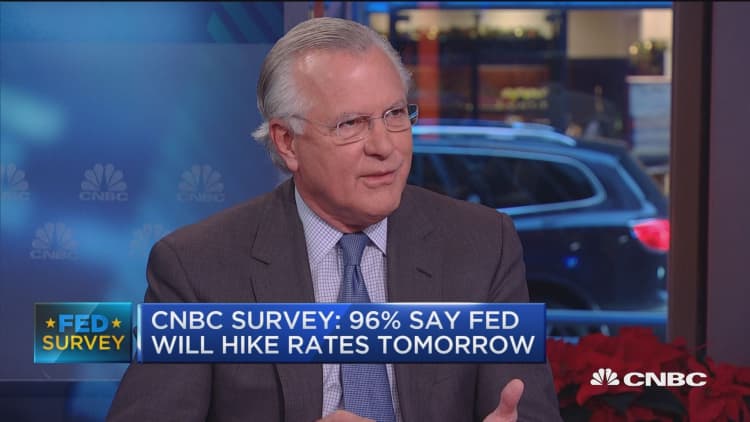
Ronald Reagan was a market-driving president-elect, but after he was inaugurated, the market adjusted to how long it would take to push his policies through, former Dallas Fed President Richard Fisher told CNBC on Tuesday.
"Ronald Reagan gets elected. The market, S&P 500, up 8.5 percent until he gets inaugurated. Next year, down 20 percent," Fisher said on "Squawk Box," cautioning viewers that the excitement surrounding Donald Trump's election and pro-growth agenda may come with pitfalls.
"What it illustrates to me is expectations are very important, optimism runs strong, but then the reality sets in how long it takes to get things done," Fisher said.
Fisher spoke as Fed policymakers were gathering in Washington for a two-day meeting. At the conclusion of the meeting Wednesday, they are expected to announce their first interest rate hike in a year and the second in a decade.
Fisher predicted the Fed will announce a quarter-point interest rate hike on Wednesday. He said he would be watching for whether Fed Chair Janet Yellen would repeat one key phrase with regards to future hikes: "slow and gradual."
If he were still a Federal Reserve official, Fisher said he would be upping his rate, growth and inflation forecasts, but not altering anything too radically until real policy change could be seen.
"I would be certainly discounting the fact that we're going to have, for the first time since Ronald Reagan, the opportunity to bring about real change. And what that means is breaking out of the secular stagnation," Fisher said.
"If we're able to break out of that channel, then you're going to see faster rate rises," he said.
With growing investor optimism about the Trump administration's policies like tax reform, deregulation and revamping the Affordable Care Act, Fisher wondered when rates would "catch up with" the stock market rally.
"They have some cover to move a little more quickly than the market had assumed," Fisher said, referring to the Fed.


